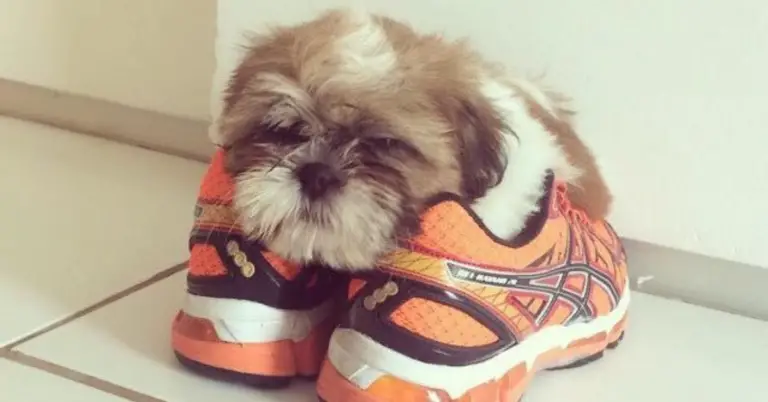Shih Tzus are one of the most lovable companion dogs that love being around their humans. But, this loving quality also means they cannot be left alone for long periods.
When you bring a four-legged friend home, they come with a huge list of responsibilities that you cannot ignore. Making sure your dog is in sound mental health is one of them.
So, what do you do when your Shih Tzu is showing symptoms of anxiety and stress?
Here’s a helpful guide to helping your Shih Tzu overcome separation anxiety and develop confidence, independence, and better overall mental health.

What Is Shih Tzu Separation Anxiety?
Shih Tzu separation anxiety is the extreme stress or panic that your Shih Tzu exhibits when left alone. You may have noticed unusual behavior in your dog when you are getting ready to go out. They may urinate, defecate, tear furniture, howl, or exhibit other such attention-grabbing behavior.
These behaviors are not done out of malice, but because the dog is too stressed and does not know what to do. Such high levels of stress on a consistent basis can affect their health, compromising the immune system, and may even cause panic attacks.
Separation anxiety can occur in any dog, even highly-trained and well-behaved ones, but puppies and smaller dog breeds are known to be most susceptible to it.
Thankfully, proper training and socializing can help reduce separation anxiety significantly.
What Causes Separation Anxiety in Shih Tzus?
Many factors can cause your Shih Tzu to develop separation anxiety.
Sometimes, puppies are separated from the litter too soon, weaned too early, and not socialized enough during the early stages.
So, when they get a new owner, they develop a lot of attachment and fear of losing that security. This can lead to separation anxiety.
Another reason is that Shih Tzus were bred to be companion dogs, so they are incredibly friendly and loving.
But, they also need a lot of attention.
Shih Tzus are constantly seeking companionship and undergo severe distress if left alone for too long.
Symptoms of Separation Anxiety on Shih Tzus
Separation anxiety is a serious condition that goes beyond the occasional misbehavior.
The barking and whining could be because the dog got startled by a stranger or a loud noise.
And the misbehaviors could be the result of inadequate training and have nothing to do with separation anxiety.
So, it’s crucial to be able to identify specific signs of separation anxiety.
You can check whether your Shih Tzu is demonstrating two or more of the below symptoms.
Make note if the behavior occurs consistently or sporadically.
If they happen only occasionally, it may be due to some other reasons and not separation anxiety.
1. Your Shih Tzu makes an exaggerated fuss every time you leave or are getting ready to leave.
2. On sensing that you are about to leave, your Shih Tzu will follow you from one room to another, howling and whining.
3. He may try to stop you from leaving by doing things that will grab your attention like urinating, defecating, blocking the doorway, sitting on your shoes, or pulling at your clothes.
4. Once you leave, your Shih Tzu will probably whine loudly, bark, or demonstrate other behavior like tearing at the furniture, shoes, curtains, and more.
5. Your dog may lose his appetite and may scratch surfaces, doors, and windows or even try to escape.
6. When you return, you can expect an unusually long welcome. Your Shih Tzu will jump on you, get a lot of licks in, or hover over you for far longer than usual.
How Can You Help Your Shih Tzu Cope With Separation Anxiety?
 Shih Tzu Cope With Separation Anxiety?” class=”wp-image-1020″/>
Shih Tzu Cope With Separation Anxiety?” class=”wp-image-1020″/>Seeing your Shih Tzu in such distress can be very heartbreaking. However, with a proper approach and training, you can help your Shih Tzu overcome the issue and become confident and independent enough to be left alone.
Crate Training
When crate training your Shih Tzu, you need to ensure that your dog associates the crate with a happy and safe place.
Keep the crate stocked with food and fresh water, chew toys, as well as food-releasing puzzle toys.
Notice your dog’s behavior when left in a crate. If he is resisting being in a crate, leave him for shorter periods.
As he realizes that you always come back, his anxiety will decrease, and he will stop whining and barking.
Desensitization And Counterconditioning
Desensitize your puppy to your leaving routine. Wear your coat but go to the kitchen and start cooking or carry your office bag to the toilet.
Alternatively, you can make your dog look forward to you leaving by giving him a treat every time you pick up your keys or head towards the door.
Or reward him on return. Stay away for shorter periods and increase the time gradually.
When the puppy will receive a treat on your return, he will be eager to see you leave instead of feeling anxious.
Exercise
Regular exercise is not a cure for separation anxiety, but it can certainly help. Exercise will help your puppy burn off any excess energy that he was directing towards destructive behaviors.
A well-exercised dog is also a more content dog. Do not forget to include brain games like puzzles, as they are equally important. A physically and mentally exhausted puppy will readily settle down when you leave.
Do Not Encourage Clinginess
Try teaching your puppy to stay on his own. Leave him in another room or a crate even when you are home.
Do not make leaving and returning big celebrated moments. Do not overly fuss over your dog when you leave or return, or else he will consider them major events that he needs to worry about.
Medications
If the separation anxiety is affecting your dog’s normal functioning, your vet may prescribe anxiety medications to allow your Shih Tzu to become more stable.
However, remember that medications and supplements are only for relieving panic attacks and anxiety symptoms and are not a cure for separation anxiety.
What To Do When Your Shih Tzu Is Stressed?
If you notice your dog behaving unusually and suspect that he is stressed or anxious, here are some things you can do to help your dog overcome stress.
1. Make sure that what your Shih Tzu is feeling is stress and separation anxiety and not some other health condition that is causing this change in behavior. If it is indeed stress, try to find what is causing it.
2. If you cannot find the root cause, consult a dog trainer or an expert. Identifying the trigger can go a long way in helping your dog become more comfortable and happy.
3. Never force your Shih Tzu to face the subject of his fear. It may increase his anxiety, and you may end up causing irreparable damage.
4. You can divert his attention when he is stressed by using engaging toys or making him sit in his safe place or a crate.
5. You can try to desensitize your Shih Tzu towards the source of his stress, but do so very gradually. And stop this training immediately if you find it is causing him more stress.
6. Devote more time to your Shih Tzu. Set aside some time specifically for playing, going to the park, and keeping him engaged.
Conclusion
No dog wants his human to leave him alone, but Shih Tzus are particularly sensitive.
If you find your Shih Tzu behaving abnormally when you leave or if you’ve been returning to a very messy home, there is a high chance that your dog is experiencing separation anxiety.
We hope our tips guide you to help your Shih Tzu overcome this stress and anxiety and become a more independent, confident, and happy dog.







